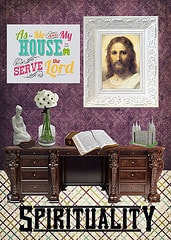 The next guest post in our Establish A House series comes from my good friend Deirdre. I marvel at how the internet connected a Mormon and a Catholic living on different sides of the U.S.A! Deirdre always uses song lyrics to name her posts. The song from Peter, Paul and Mary is the perfect title for this post.
The next guest post in our Establish A House series comes from my good friend Deirdre. I marvel at how the internet connected a Mormon and a Catholic living on different sides of the U.S.A! Deirdre always uses song lyrics to name her posts. The song from Peter, Paul and Mary is the perfect title for this post.
Hello, I’m Deirdre! I am currently at home running our little domestic church with my husband James. We reside in Southeast Virginia where we are surrounded by beautiful waterways, the Historic Triangle, and lately lots of pollen. We are a Catholic family with two boys (14 and 11) and two girls (8 and 3). My days are spent feeding children, making lunches, feeding children, escaping to sew, feeding children, laughing a lot, feeding children, and rejoicing in the gifts I have. I occasionally work as a civil engineer and I adore music. I think in song lyrics and weave them into everyday conversation. It’s a sickness that I’ve passed onto my children. We don’t always get this gig called family life just right, but we always have fun together.
Let’s Start at the Very Beginning:
Much like the fabulous Fraulein Maria taught only those most important first notes, our first lessons for our children were simple directions. We taught “Do this” and “Don’t do that”; “right” and “wrong”; and “yes!” or “no!” Once we could see the little gears of reasoning turning in their heads, we started backing our directions with cause and effect statements – “Your Tonka trucks will rust if you leave them in the rain. Put them in the garage.”
In the meantime, we were also just trying to live this wonderful quote by St. Francis:
Preach the Gospel at all times and, when necessary, use words.
I’m sure we didn’t realize it at the time, but our daily actions of waiting our turn at the busy grocery checkout, offering help to our neighbors, and tending to our household were setting examples of behavior for our children. We knew from the beginning that we would certainly raise our children to share and rejoice in our faith and would work to make them responsible, caring, moral members of society.
 |
| (not a very impressive parenting tool, I know) |
We imagine our children, at various ages and developmental stages, inside a funnel. The youngest ages are down inside the very narrow neck where much guidance, direction, and oversight are required. The older ones are inside the slightly wider middle of the funnel neck with a bit more wiggle room to experiment with decision making and reasoning. All along their growth and travel “up the neck,” we assist them.
When our oldest was about two, my mother-in-law told me to only give him two options or choices until he was four or five. “Do you want to play blocks or Little People?” Too many options were overwhelming and he wouldn’t be able to make a confident choice. This was excellent advice, and we quickly realized that the ability to make a confident choice would serve our children well in the real world. This whole theory fits with the funnel analogy. The narrowest portion just doesn’t allow for much decision making power, while the widest mouth portion yields freedoms and responsibilities.
We use Bible story books and devotionals geared toward teaching their specific age groups. Five Minute Devotions is my favorite for the youngest (toddler to preschooler) age group. They love the animal stories and I enjoy that God’s word is broken down to a level they understand.
 |
| (Laugh out loud is really good advice) |
Stuck in the Middle With You
The middle of the funnel can be a very gray area, making our role as parents a little murky some days. Do we allow the elementary student to create her own schedule for completing a school project, or do we set minor parameters for her to work within? The answer for us is always that it depends on the child. Some of ours are more capable decision makers than others at any given age.
This is the time period in which we really try to let each child make decisions, sometimes big ones, just to see what they will pick and what can be learned. The good news is that they are still very much within our “jump in and rescue” reach. The bad news is that they often have to deal with any consequence or fall out from their decision making. Little by little we see real growth as they start to choose in accordance with our family beliefs and faith guidelines.
Our elementary student is using the Living Faith Kids devotional series. This Catholic series uses excerpts from the daily assigned readings to teach faith and morality issues at a very understandable level. The explanations accompanying the readings ask thought provoking questions and include a small prayer of action. We’ve started using this series as dinner table discussions. Our daughter reads the day’s selection, and conversation is generated as each member offers viewpoints, anecdotes or questions. Since my husband uses the adult version of this series, he is able to offer the more mature connection to our daily lives.
In our faith, we prepare our children to first celebrate the Sacrament of Reconciliation at age 7 or 8. We review and really reinforce the 10 Commandments at this time. There is a wonderful examination of conscience here that asks the child to consider very specific ideas related to the commandments. As we discuss these questions, we really get to emphasize our family’s stance on moral issues. Other versions for teens and adults are also available.
 |
| (He is her favorite nap pillow) |
Fly Like an Eagle, Let that Spirit Carry Me
So far, only our oldest (almost 15) has really reached the top of that funnel. He’s staunchly grounded in his beliefs and disciplines, and his involvement in the church youth group enhances the faith disciplines we’ve presented at home. When faced with decisions or conundrums, he tends to quietly review his options and then consult with us. We are happy to act as sounding boards since we often call our own parents for advice or “when this happened to you, what did you do?” questions.
Much like my own parents were with my sister and me, we’ve always tried to be open in our discussions concerning finances, sexual conduct, and other important life topics. On more than one occasion, our oldest has threatened to poke out his mind’s eye after a particularly frank discussion about relationships! He’s very interested in politics, so many conversations often debate “the right thing to do” versus the “politically correct thing to do”.
One facet of moral development that we’ve been happy to embrace is Scouting, particularly Boy Scouts. Both boys participated in Cub Scouts, but only since joining Boy Scouts have we seen great strides in self-discipline, inter-personal relationship skills, and accountability. We see similar advantages to Girl Scouts, but our daughter is still in the younger stages where not much responsibility is expected.
Oops! I Did It Again!
(Please tell me you see the irony of quoting Ms. Spears here!)
I would be remiss if I didn’t mention one of the greatest morality teaching tools my husband and I think parents have in their arsenal. It’s the power of the apology. Truly, we don’t always get it right when we are dealing with our children or with our peers. Being strong enough to look your child in the face and say, “I really didn’t handle [this situation] well and I am sorry,” presents a huge teaching moment. This has happened in our home many times J. In fact, the name of my blog is We Are New Everyday because I know we don’t get it right all the time and we need to face each new day as a new chance, with each other and with God.
Thanks, Cocoa, so much for letting me share your space and a bit of our lives. I am honored to be a part of Establish a House. And I just can’t resist….”So long, farewell!“


So many good thoughts and practices for teaching and loving our children! Thank you, Deirdre!
Deirdre….Thanks for the post! I think the most important thing you expressed is that morally teaching your children is an active process. It isn’t left to chance and there is a plan. I really like the idea of the funnel! Decision making is like that! My husband would add that not only does the funnel analogy work for age choices and freedoms, but it also works for obedience choice…i.e. those who make wise and obedient choices are free to have more options available to them (the top of the funnel), and those who choose disobedience and sin, the further their power of choice is restricted (the bottom of the funnel). Thanks for the thoughts! Happy parenting in Virginia!
I love the quote by St. Francis! Thanks for sharing your ideas.
Hi neighbor! (We live in southeast VA too–the Hickory section of Chesapeake, to be exact). I appreciate your insights into the importance of allowing our children to experience the consequences of their actions. That is something that I know that I need to do better. Starting when they are young so the negative consequences aren’t as painful and is kinder to them (and us). I will try to implement St. Francis’ wisdom. I look forward to the positive results that I’m sure will follow.
Love this, Such great advice! It really is so important to let your children practice making decisions so when it comes to really important things in life they have already figured out choice and consequence. I also love what you said about apologizing. We expect children to apologize but sometimes it’s hard for us to eat crow. Thanks for your beautiful thoughts!
Wow, Deirdra. Such wise words. You’ve strengthened my resolve to increase both the quantity and quality of gospel teaching in our home.
Beautiful and insightful. Thank you!